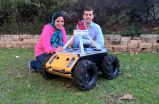Genetically modified fish on the loose?
The fates of escaped transgenic fish are difficult to predict
2015-06-10
(Press-News.org) Genetically modified fish that overexpress growth hormone have been created for more than 25 years, but unlike many domesticated crops, transgenic fish have yet to enter commercial production. Because of the difficulty inherent in eradicating an established fish population, efforts are under way to model the threat posed by possible invasions.
In an article for an upcoming issue of BioScience, a team of government and academic researchers, led by Robert Devlin of Fisheries and Oceans Canada, examined the possible outcomes of an accidental release of transgenic fish. Their research points to numerous difficulties in modeling the prospective fitness and invasion potential of released transgenic fish (http://io.aibs.org/devlin).
The genetically modified salmonids the authors studied possess a suite of traits that may, under different conditions and at different life stages, render them more or less fit than wild-type salmon. For instance, the authors report that growth hormone-transgenic salmon exhibit enhanced feeding motivation. This altered feeding behavior could help them outcompete wild-type fish for food. However, more aggressive feeding might expose the transgenic fish to greater predation risk, thereby reducing their net fitness. Unraveling the net consequences of such opposing effects poses a significant challenge for regulators and decisionmakers, the authors say.
Also troublesome for modeling is the wide range of possible invasion scenarios. Even though many transgenic lines are expected to have reduced fitness compared with wild-type conspecifics, they could become established in alternative niches. As the authors put it, 'Many novel genotypes in the form of invasive species can successfully establish in new ecosystems even without having a specific evolutionary history in those locations.' Further complicating matters is the possibility of transgenic fishes' adapting to the local habitats and selection pressures of the ecosystems they invade.
To address these wide-ranging concerns, the authors suggest a modeling approach that relies on the assessment of transgenic and surrogate strains in a broad array of conditions designed to simulate natural ecosystems. However, they caution, whether such risk assessments will sufficiently reduce uncertainty and preserve ecosystems 'remains a significant objective for further research.'
INFORMATION:
BioScience, published monthly by Oxford Journals, is the journal of the American Institute of Biological Sciences (AIBS). BioScience is a forum for integrating the life sciences that publishes commentary and peer-reviewed articles. The journal has been published since 1964. AIBS is a meta-level organization for professional scientific societies and organizations that are involved with biology. It represents nearly 160 member societies and organizations. Follow BioScience on Twitter.
Oxford Journals is a division of Oxford University Press. Oxford Journals publishes well over 300 academic and research journals covering a broad range of subject areas, two-thirds of which are published in collaboration with learned societies and other international organizations. The division been publishing journals for more than a century, and as part of the world's oldest and largest university press, has more than 500 years of publishing expertise behind it. Follow Oxford Journals on Twitter.
ELSE PRESS RELEASES FROM THIS DATE:
2015-06-10
The air around us is a chaotic superhighway of molecules whizzing through space and constantly colliding with each other at speeds of hundreds of miles per hour. Such erratic molecular behavior is normal at ambient temperatures.
But scientists have long suspected that if temperatures were to plunge to near absolute zero, molecules would come to a screeching halt, ceasing their individual chaotic motion and behaving as one collective body. This more orderly molecular behavior would begin to form very strange, exotic states of matter -- states that have never been observed ...
2015-06-10
Most galaxies are clumped together in groups or clusters. A neighboring galaxy is never far away. But this galaxy, known as NGC 6503, has found itself in a lonely position, at the edge of a strangely empty patch of space called the Local Void.
The Local Void is a huge stretch of space that is at least 150 million light-years across. It seems completely empty of stars or galaxies. The galaxy's odd location on the edge of this never-land led stargazer Stephen James O'Meara to dub it the "Lost-In-Space galaxy" in his 2007 book, Hidden Treasures.
NGC 6503 is 18 million ...
2015-06-10
New research from UBC and the Child & Family Research Institute at BC Children's Hospital shows that risky outdoor play is not only good for children's health but also encourages creativity, social skills and resilience.
The findings, published in the International Journal of Environmental Research and Public Health, found that children who participated in physical activity such as climbing and jumping, rough and tumble play and exploring alone, displayed greater physical and social health.
"We found that play environments where children could take risks promoted increased ...
2015-06-10
Google searches for information on melanoma and skin cancer increased over the summer months during a five-year period, although the level of interest did not correlate with the melanoma mortality to incidence ratio, suggesting that increased search volumes may not be associated with early detection, according to a research letter published online by JAMA Dermatology.
Researcher Kyle T. Amber, M.D., of MacNeal Hospital, Berwyn, Ill., and coauthors used Google Trends, a research tool which quantifies interest in topics at the population level by analyzing all search queries ...
2015-06-10
For years, research on nuclear weapons has relied on old data, limited experiments and computer modeling. But this year, that pattern has changed. Scientists have run new experiments that simulate what happens to plutonium in a nuclear explosion, according to an article in Chemical & Engineering News (C&EN), the weekly newsmagazine of the American Chemical Society. The research will deepen scientists' understanding of the element -- and help them analyze a nuclear event should one occur.
In the article, Jyllian Kemsley, a senior editor at C&EN, notes that six years ago, ...
2015-06-10
Using the intestinal hormone GLP-1 in obesity treatment prevents the loss of bone mass otherwise frequently associated with major weight loss. This is the finding of a new study from the University of Copenhagen, Hvidovre and Glostrup Hospital. According to the researchers behind the study, the results may have a significant bearing on future obesity treatment.
Rapid weight loss leads to a loss of bone mass and an increased risk of bone fractures. New research shows that treating obesity with the GLP-1 hormone helps prevent loss of bone mass in addition to having a number ...
2015-06-10
June 10, 2015--Low-income families bear the brunt of high-energy costs and poor thermal comfort from poorly maintained apartment buildings. To study how energy efficiency upgrades could help these households, researchers at Columbia University's Mailman School of Public Health surveyed residents in a low-income community in New York City. They found that while energy efficiency upgrades varied significantly by ownership status, low-income single-family homeowners reaped the greatest direct benefits. Results overall showed that respondents experienced improved thermal comfort, ...
2015-06-10
WASHINGTON - While a 1980 reform law enabled the modernization and stabilization of the U.S. freight railroad industry, federal regulation has not kept pace with the industry's transformation and should be replaced with a system better-suited for today's freight rail system, says a new congressionally mandated report from the National Research Council's Transportation Research Board. Current policies designed to protect rail shippers who lack transportation options from excessive rates are not working for shippers of most commodities, including grain. More appropriate, ...
2015-06-10
The way insects see and track their prey is being applied to a new robot under development at the University of Adelaide, in the hopes of improving robot visual systems.
The project - which crosses the boundaries of neuroscience, mechanical engineering and computer science - builds on years of research into insect vision at the University.
In a new paper published today in the Journal of The Royal Society Interface, researchers describe how the learnings from both insects and humans can be applied in a model virtual reality simulation, enabling an artificial intelligence ...
2015-06-10
CHICAGO (June 10, 2015): As health insurers place more emphasis on paying for quality outcomes rather than for specific services provided by doctors and hospitals, several quality improvement programs have been developed as a way to help health care providers identify problem areas and share best practices. While some studies have evaluated how well these quality improvement programs achieve their goals, not many have focused on the area of trauma care. But now a team of trauma surgeons at the University of Michigan in Ann Arbor have reported how data from a statewide ...
LAST 30 PRESS RELEASES:
[Press-News.org] Genetically modified fish on the loose?
The fates of escaped transgenic fish are difficult to predict

